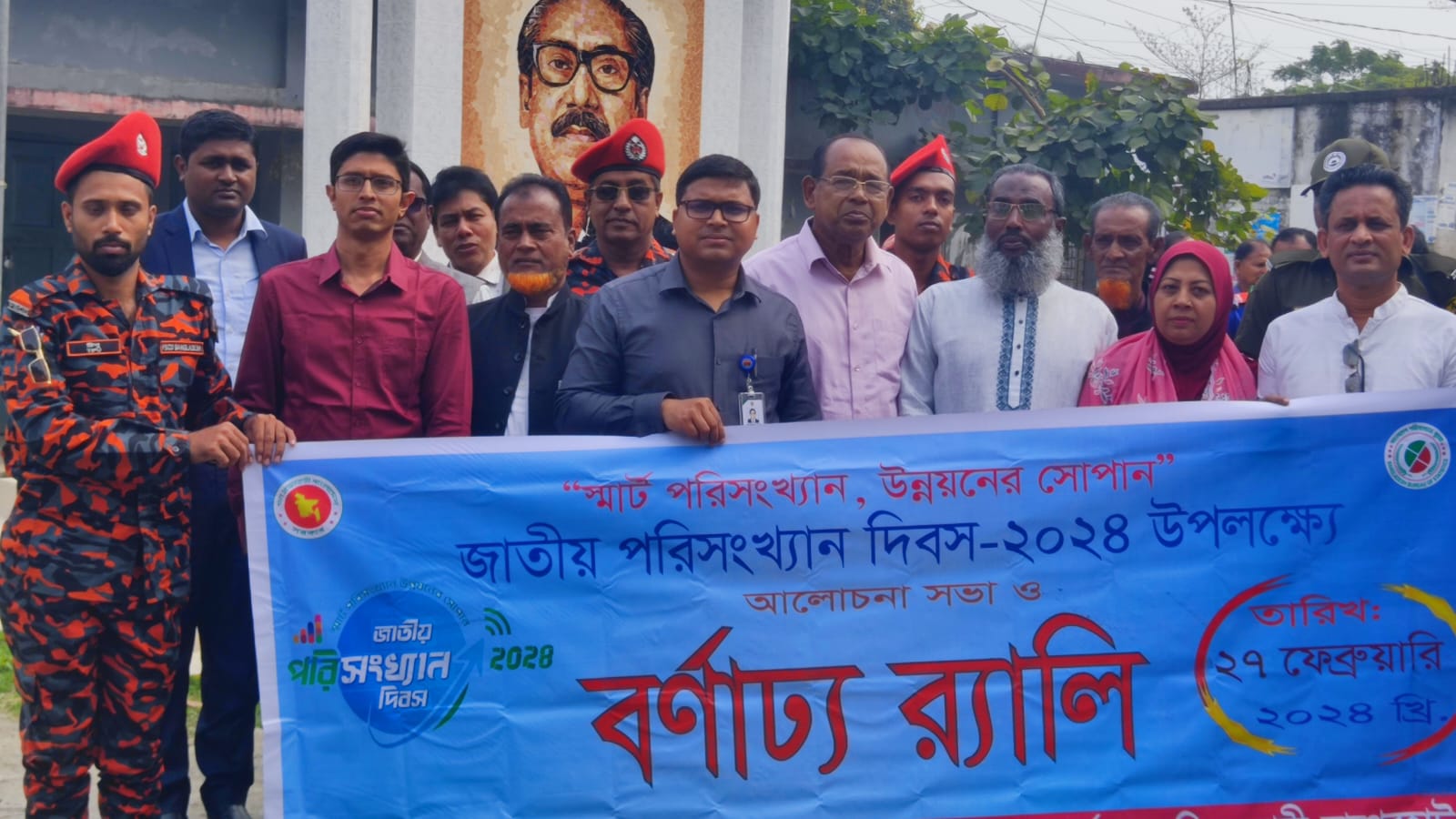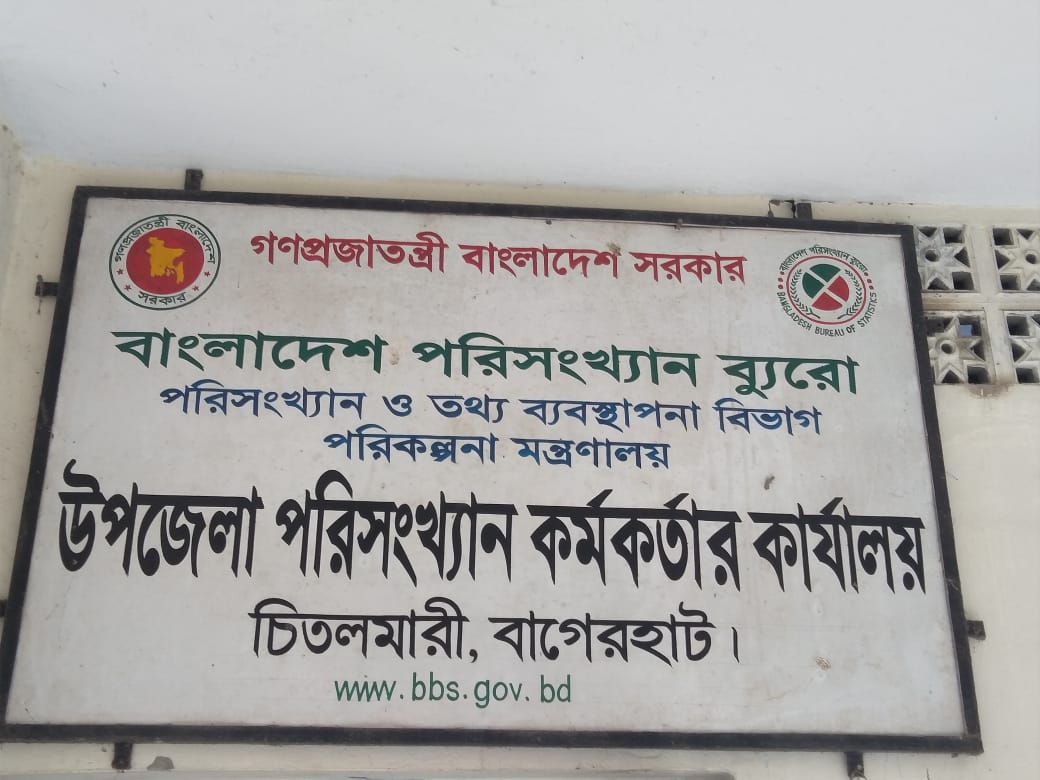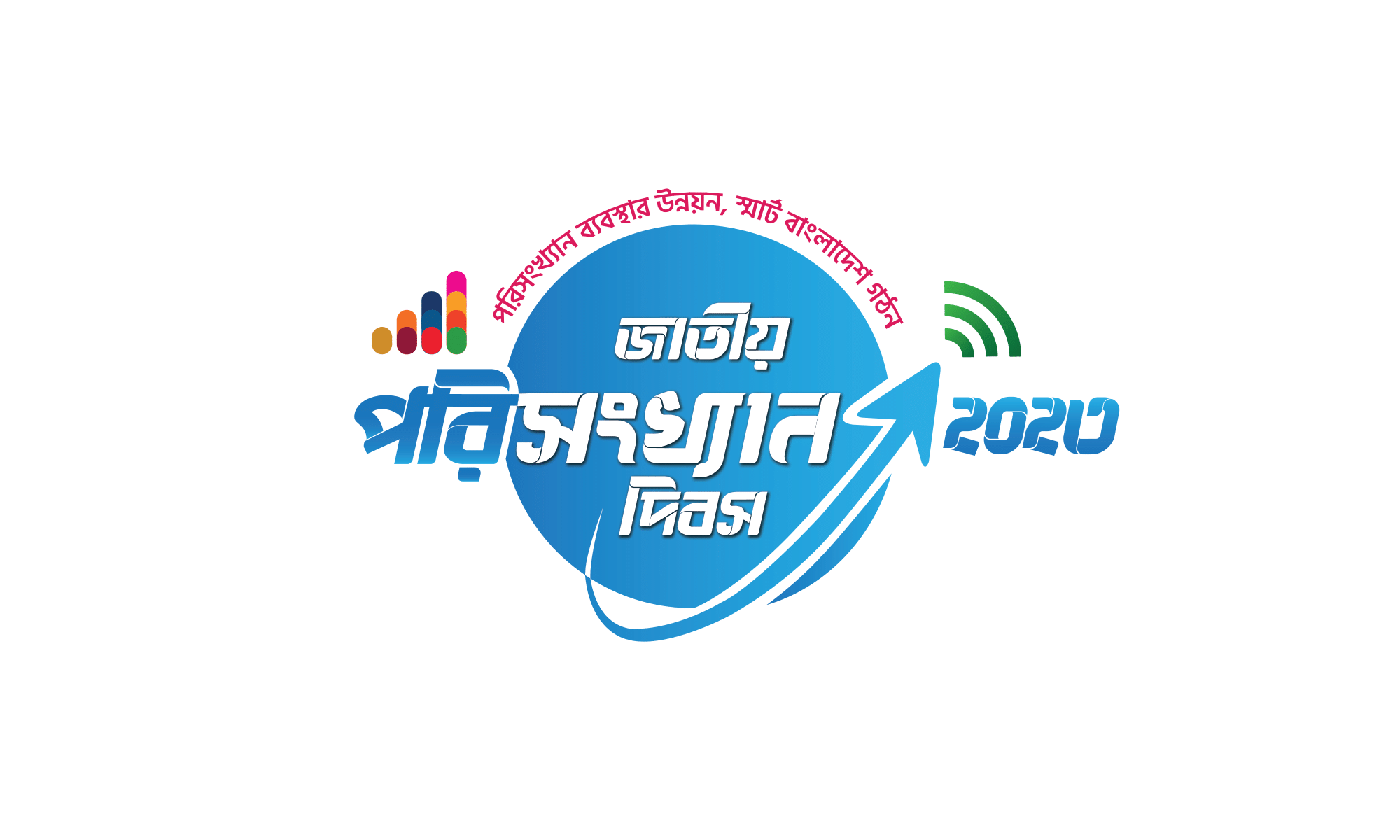A collection of events
Background:
After the great freedom struggle of 1971, realizing the equal importance of statistics in formulating proper plans, development and monitoring progress in Bangladesh, as a result of the far-reaching thinking and direction of Bangabandhu Sheikh Mujibur Rahman, the architect of the nation, the architect of the nation, on August 26, 1974, 4 statistical offices under different ministries (Ministry of Planning) The BBS was established by merging the Bureau of Statistics, the Bureau of Agricultural Statistics under the Ministry of Agriculture and the Agricultural Census Commission and the Census Commission under the Ministry of Home Affairs. Previously, as there was no integrated law, rule or policy in preparing and publishing statistics, the work of BBS was being conducted through some orders and circulars. With the passage of the Statistics Act in the Mahan Jatiya Sangsad on 27 February 2013, the BBS got a real legal basis. A new chapter in the history of BBS was initiated by gazette notification on March 3 of the same year after the passage of the Act as per Section 6 of the said Act. It is functioning as the national statistical agency of the country.
Vision of BBS
Established locally and internationally as a national statistical institution.
Mission of BBS
• Providing accurate, standardized and timely statistics;
• Providing data on demand to policy makers, planners, researchers and decision makers;
•Increasing institutional capacity;
• Establishment of professionalism.
Functions of BBS:
To fulfill the objectives of the Statistics Act, 2013, the functions of BBS are as follows:
(a) preparation and maintenance of correct, accurate and timely statistics;
(b) Conducting surveys in various socio-economic areas of the country to produce correct, accurate and timely statistics;
(c) undertake all activities for the purposes of population census, agricultural census, fisheries and livestock census, economic census and other censuses and surveys;
(d) Providing rapid, reliable and user-friendly statistics as per the needs of development planners, policy-makers, research and educational institutions, national and international organizations and other users at the government level;
(e) formulation of statistical policies and procedures;
(f) On-the-ground supervision of the activities of the branch office and taking measures to review and publish its report where applicable;
(g) introducing and updating the National Strategy for the Development of Statistics from time to time;
(h) undertaking necessary training programs aimed at creating skilled manpower in statistics;
(j) raising public awareness of the importance of the role and function of statistics;
(j) ensuring the use of information technology in carrying out statistical activities;
(k) providing necessary coordination and cooperation with any authority, consulting firm, non-governmental organization and international organization on statistics;
(l) preparation of consumer price index and other price indices and national accounts;
(d) formulation and publication of economic, environmental, social and demographic guidelines;
(d) Estimates of production, production costs and amount of land under crops, including land use;
(n) developing and maintaining the Geo-code system as the sole Government Geo-code system and encouraging all other Government bodies or institutions to use it;
(p) formulation and updating of National Population Register from time to time;
(th) Formulation of integrated Central Geographical Information System (Geographic Information System);
(d) Standardization of international means of statistics;
(d) creation of National Information Repository including alternative system of preservation and archiving in modern manner;
(n) Authentication of official statistics prepared for national and international organizations;
(p) provision of statistical consultancy services;
(f) performing such other duties as may be directed by the Government; And
(b) Taking necessary measures for the performance of the above duties and functions.
Vision 2021 and BBS:
One of the goals of the government's Vision 2021 (Vision 2021) is to establish a digital Bangladesh. Statistics and information technology is one of the strengths of transforming digital Bangladesh. Considering that, the name of Statistics Division has been changed to Statistics and Informatics Division (SID) in 2012.
With the passage of the Statistics Act by the Mahan Jatiya Sangsad on 27 February 2013, the BBS got a real legal framework. National Strategy for the Development of Statistics (NSDS) was formulated in 2013 with the aim of formulating short, medium and long term plans for the overall development of the country's statistical system. NSDS is a detailed, realistic, participatory, dynamic and state-owned planning document for holistic development of statistical systems. According to the target, its implementation will be completed by 2023. By implementing it, it is possible to formulate information-based, accurate, reliable and effective national policies and plans of the country in the future.
The Honorable Prime Minister of the People's Republic of Bangladesh, Sheikh Hasina, realized the importance of statistics and said, "Our government has enacted the Statistics Act, 2013 considering the importance of official statistics in the development of the national statistical system. National Strategy Paper on Statistical Development (NSDS) 2013 approved. Statistical system is considered as the main basis of the overall development plan We have taken initiatives to strengthen the Bangladesh Bureau of Statistics from the center to the grassroots level”.
Actions of BBS in building Vision 2021 and Digital Bangladesh:
BBS prepares and publishes government statistics by collecting, compiling, analyzing and processing statistical information and data. Besides collecting, preparing and publishing various official statistics, BBS has been providing necessary data for the implementation and progress review of the Government's Vision 2021. Following are the main activities in this regard:
A. ICT related activities:
• Digital Information System: In keeping with the current government's Digital Vision, all census and survey information of BBS has been stored in the server through Web enabled GIS based Information System and the information of Division, District, Upazila/ Thana, Union and Mouza has been presented graphically in digital format. Moreover, the Geo-Master file is stored and updated by BBS to present and provide information services through GIS Map of various mauzas, unions, police stations/upazilas, district and departmental levels of Bangladesh and this code is used in the work of other government agencies. .
• Streamlining Geo Coding System: Correct and specify the name of administrative division, district, upazila, union, mauza, village, city corporation, municipality, mohalla and key point installation in Bengali and English, all these specific names have a legal status (Legal Status). Providing, Jio code is working to provide number.
• Geographic Information System (GIS) Map: Maps of all the mouzas/mahallas have been prepared using GIS software by collecting images of the entire country through aerial photography. Due to GIS Map, the task of presenting map based information in any area has become easy. The use of these maps has improved census coverage and improved the quality of census and survey.
• Data Recovery Lab: Data Recovery Lab has been established to convert the census and survey data stored on magnetic tape by BBS into digital system. Data has been stored on magnetic tapes since the 1980s and digitalization will make data easier to use.
• E-Publication: E-publication is an advanced version of digital technology. Thanks to technology, researchers, planners, policy makers, students and users can now easily collect the necessary information and data online at home and online. That is why BBS has taken a revolutionary step 'e-publication system'. As a result, provisional and final reports of Census, Economic Census and other national surveys published/approved by BBS from time to time are now available online for download and use.
• E-Attendance Register: BBS has taken necessary steps to set up 'E-Attendance Register' system as part of Government's 'Rupkalp-2021' program to ensure timely arrival and departure of officials/employees from government offices. In this method, attendance will be confirmed using Thumb Recognition Scanner and it will be stored in the server as a database.
• Development of Dynamic Website: State-of-the-art website has been developed and launched to ensure fastest communication and information delivery to BBS headquarters and field offices, various government ministries and Globally.
• Strengthening Capacity of BBS in Population and Demographic Data Collection Using GIS: Digital maps of all mauzas/mahallas of 64 districts have been updated by BBS under this programme. Which is one of the progress in the formation of digital Bangladesh announced by the current government.
Census and Survey Activities:
(a) Population Census (Census) and Household Census: Collection of data for quality benchmark database on population size, geographical distribution and demographic characteristics, formulation and implementation of national development plans, delimitation of constituencies, fair and equitable distribution of national resources, regional quotas in employment. Population census (census) and household census data are essential for activities such as determination. On 15-19 March 2011, the country's fifth population census (census) and household census was held. For the first time iCADE Software was used in the said census and the data of 2011 census was processed on ICR machine. By using digital method it is possible to give accurate results of census at the fastest time. 05 national reports, 64 district reports, community reports of all districts have been published under this census. Also 14 monographs and 01 population projection report have been prepared.
(b) Economic Census: In March-May 2013, the third economic census data collection program was completed in Bangladesh. The main objective of this census is to build a statistical base for planned development of non-agricultural sectors. The preliminary results of the census were released on November 17, 2013 in record time after processing the data collected through the Third Economic Census. Apart from this, post-enumeration verification (PEC) activities are completed by the Bangladesh Development Research Institute in the shortest possible time after the completion of the main census in order to check the quality of the data collected through the census. State-of-the-art application of government at local level through Union Information and Services Center (UISC) for the first time using modern software. Economic census data is computerized at BBS headquarters in the shortest possible time using T. All Economic Census reports have been released on time. Business Register: Preparation of Business Register has already been undertaken with the aim of creating a complete centralized database containing some important basic information of every permanent business in the country. It will be used as the main framework for preparing the country's economic statistics. The business register will contain information about each establishment's name, address, legal structure, type of operations, number of manpower employed, average annual production, total assets, etc.
(c) Agricultural Census: The next i.e. 5th agricultural census of the country will be held in 2019 in a ten-year cycle. Agriculture (Cereals, Fisheries and Livestock) Census will be conducted as per Statistics Act 2013. It has been decided to conduct this census in a coordinated manner. Information on infrastructural changes in agriculture, land use, fisheries and livestock sectors will be collected and published in this census.
(d) Vital Statistics: Since 1980, BBS has been conducting the Sample Vital Registration System survey regularly for annual projected population, birth rate, death rate, infant mortality rate, maternal mortality rate, life expectancy, marriage/divorce rate, arrival-exit rate, use of birth control. Rates and handicap rates etc. are published.
(e) Census of Technical and Vocational Education and Training (TVET) Institutions: BBS Technical and Vocational Education and Training (TVET) for the first time in the country to collect information about the actual status of skill development activities of technical and vocational education and training institutions run by public and private institutions. ) conducted the Institutional Census 2015.
(f) Other Censuses and Surveys: BBS also prepares statistics through various surveys on a regular basis in terms of revenue and development sector budget. In the financial year 2014-15 various wing-based programs such as Slum Census and Floating Population Census 2014, Health and Morbidity Status Survey 2014, Child Mother Nutrition Survey 2014, Education Household Survey 2014, Climate Change Impact Survey 2015, Rural Credit Survey 2014, various crops Completed the activities of Productivity Assessment Survey, National Accounts Development Program and State Phase for National Population Registrar. BBS also regularly conducts quarterly Labor Force Survey, Child Labor Survey, Multiple Indicator Cluster Survey, Productivity Survey, Survey of Manufacturing Industry and Wage Rate Survey etc.
Following are the important censuses and surveys conducted by BBS since its inception:
1 Census and Household Census A total of 5 censuses have been conducted since 1974 at 10-year intervals
2 Economic Census A total of 3 censuses have been conducted since 1986
3 Agricultural Census A total of 4 censuses have been conducted since 1977
4 Household Income Expenditure Survey A total of 15 surveys have been conducted since 1973-74
5 Labor Force Survey 13 surveys have been conducted since 1980
6 Sample Vital Registration Survey has been conducted regularly since 1980 on annual basis
7 Manufacturing Industries Survey Since 1972, 28 surveys have been conducted
8 Multiple Indicator Cluster Survey 12 surveys have been conducted since 1993
9 Child Nutrition Survey 7 surveys have been conducted since 1985-86
10 Agricultural Cluster Survey is being conducted regularly since 1974 on annual basis
11 The Wage Rate Survey has been conducted regularly since 1974 on an annual basis
12 Price and wage statistics have been held regularly on an annual basis since 1974
13 Health and Demographic Surveys 5 surveys have been conducted since 1980
14 Agricultural Crops Acreage and Production Survey is being conducted regularly since 1972 on annual basis
15 Environment, Climate and Disaster Statistics Since 2016, environment, climate and disaster statistics have been published by collecting data from surveys and secondary sources.
(g) Organization of User-Producer Dialogue by BBS: Before all types of survey and census activities, BBS as Data Producer regularly conducts formal meetings, workshops, and seminars on census/survey planning, questionnaires, design, sampling method in the case of survey etc. Presents it to the stakeholders and takes their important feedback.
(h) Partnership Activities:
BBS has been working closely with various organizations, research institutes, national statistical agencies and development partners at national and international levels. BBS National Institutions like: A2i, GED, NSDC, BIDS, DAE, DGHS, ISRT and International Organizations like: UNFPA, UNDP, UNICEF, WHO, FAO, ICDDR,B, World Bank, UN-ESCAP, JICA, KOICA, SESRIC, WFP is working in coordination and research with Prabhuti.
Problems/Challenges Existing in Achieving the Targets:
The major challenge in achieving the set targets is shortage of manpower in BBS. After redesigning the organizational structure, the required manpower is still not available. There is no office building at district and divisional level and no training institute for training officers/staff. As a result, the formation of skilled manpower is hindered. Reluctance of respondents to provide statistical information and data in many cases is a hindrance in preparing accurate statistics Works on eBay. Inadequate budget for activities undertaken to achieve targets and non-timely allocation of budget slows down the pace of work.
Important recommendations of concerned Ministries/Departments in achieving the target:
It is very important to generate subject-wise Baseline data through census/survey on an urgent basis to support the Planning Commission and various Government Ministries with data in implementing the post-MDG UN declared SDGs and other Frameworks. For this purpose, it is very important to allocate the necessary budget to BBS, arrange for quick manpower recruitment, provide necessary training to increase the efficiency of officials, and build office buildings in 64 districts and 8 departments on an urgent basis. Also, it is necessary to analyze the quantitative indicators of the data to evaluate the stages of implementation of the activities undertaken by various ministries/departments as per the perspective plan 2021-2041. The partnership of BBS is very important in the type of database that various Ministries/Departments of the Government are creating. Because BBS is the only government organization that collects, prepares and provides various data on international standards. In this context, it will be appropriate to monitor and evaluate the implementation of the vision 2021 announced by the government and the return to high-middle income countries by 2041 by taking necessary initiatives.
Source: Annual Report 2018, Bangladesh Bureau of Statistics (Summary)














